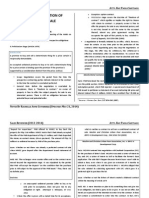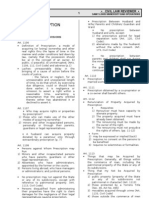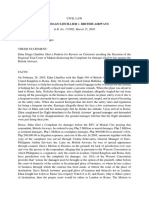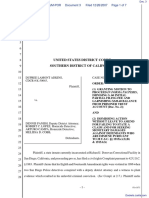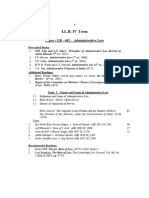0 ratings0% found this document useful (0 votes)
274 viewsSummary - Rule 116-117
Summary - Rule 116-117
Uploaded by
KathrinaRodriguezThis document outlines the rules regarding arraignment and plea in criminal proceedings. It discusses when arraignment must occur, the rights of the accused during arraignment including the right to counsel, possible pleas, and circumstances where arraignment may be suspended. The document also covers motions to quash a complaint or information, including the grounds and timing for such motions, and the effects of a sustained motion to quash.
Copyright:
© All Rights Reserved
Available Formats
Download as DOCX, PDF, TXT or read online from Scribd
Summary - Rule 116-117
Summary - Rule 116-117
Uploaded by
KathrinaRodriguez0 ratings0% found this document useful (0 votes)
274 views3 pagesThis document outlines the rules regarding arraignment and plea in criminal proceedings. It discusses when arraignment must occur, the rights of the accused during arraignment including the right to counsel, possible pleas, and circumstances where arraignment may be suspended. The document also covers motions to quash a complaint or information, including the grounds and timing for such motions, and the effects of a sustained motion to quash.
Original Description:
summary
Copyright
© © All Rights Reserved
Available Formats
DOCX, PDF, TXT or read online from Scribd
Share this document
Did you find this document useful?
Is this content inappropriate?
This document outlines the rules regarding arraignment and plea in criminal proceedings. It discusses when arraignment must occur, the rights of the accused during arraignment including the right to counsel, possible pleas, and circumstances where arraignment may be suspended. The document also covers motions to quash a complaint or information, including the grounds and timing for such motions, and the effects of a sustained motion to quash.
Copyright:
© All Rights Reserved
Available Formats
Download as DOCX, PDF, TXT or read online from Scribd
Download as docx, pdf, or txt
0 ratings0% found this document useful (0 votes)
274 views3 pagesSummary - Rule 116-117
Summary - Rule 116-117
Uploaded by
KathrinaRodriguezThis document outlines the rules regarding arraignment and plea in criminal proceedings. It discusses when arraignment must occur, the rights of the accused during arraignment including the right to counsel, possible pleas, and circumstances where arraignment may be suspended. The document also covers motions to quash a complaint or information, including the grounds and timing for such motions, and the effects of a sustained motion to quash.
Copyright:
© All Rights Reserved
Available Formats
Download as DOCX, PDF, TXT or read online from Scribd
Download as docx, pdf, or txt
You are on page 1of 3
RULE 116
Arraignment and Plea
Rule 116
An arraignment is made when the judge or clerk the judge or clerk furnishes the accused with a
copy of the complaint, reads the same in the language which he fully understands and asks him
for his plea. It is mandatory that the accused be present during an arraignment and personally
makes his plea. A plea of not guilty shall be entered for the accused when the accused refuses
to make a plea, makes a conditional plea or presents an exculpatory evidence which will lead to
the withdrawal of his guilty plea.
Should the case be raffled due to preventive detention, the arraignment shall be scheduled
within 10 days from the date of the raffle and a pre-trial conference shall be held within 10 days
after the arraignment. The appearance of the private offended party is also mandatory for plea
bargaining, determination of civil liability and etc. Otherwise, his absence may allow the accused
to enter a plea of guilty to a lesser offense.
Unless provided by special law or Supreme Court circular, the arraignment shall be scheduled
within 30 days from the date the court acquires jurisdiction over the person of the accused.
During the arraignment, the accused may plead guilty to a lesser offense with the consent of the
offended party and the prosecutor. The accused may still enter a plea of guilty to lesser offense
after the arraignment but before trial after his withdrawal of a not guilty plea.
The accused may enter a plea of guilty to capital offense after which the court shall look into his
voluntariness and full comprehension of the repercussions of his plea. In addition, the
prosecution shall be required to prove if and how guilty is the accused of the offense.
Meanwhile, in determining the penalty to be imposed in a plea of guilty to non-capital offense
and reception of evidence discretionary, the court may accept evidences from both parties.
An improvident plea of guilty may be withdrawn at any time before the finality of conviction. In
this case, the guilty plea shall be replaced by a plea of not guilty.
Prior to the arraignment, the accused shall be informed by the court of his right to counsel and
be asked if he wishes to be represented by a legal counsel. The accused may be allowed to
defend himself or to employ a counsel, otherwise, the court shall be responsible for assigning a
counsel de oficio to his case. The appointment of a counsel de officio shall take into
consideration the gravity of the offense and the difficulty of the case. Only qualified and
competent counsels shall be assigned to defend the accused. However, any person or resident
of the province with good reputation and ability to defend the accused may be assigned in case
no such members of the bar are available.
Should a counsel be assigned to defend the accused, a reasonable time before the arraignment
will be provided to consult the accused regarding his plea.
A motion for bill of particulars specifying the defects of the complaint and the details desired
may be filed by the accused to allow for proper plea and preparation for the trial.
After providing good cause and with notice to the parties, the court may require the prosecution
to produce and permit the inspection, copying or photographing of any written statement of
material evidence as well as any other tangible things containing evidence.
Arraignment may be suspended in the following situations:
1. When the accused appears to be incapable of fully understanding the charges against
him and make an intelligent plea;
2. When a prejudicial questions exists; and
3. There is a pending petition for review of the resolution of the prosecutor at the
Department of Justice or office of the president. However, the suspension shall not last
longer than 60 days counted from the filing of the petition.
RULE 117
Motion to Quash
A motion to quash the complaint or information may be filed any time before the accused enters
his plea. The motion shall be made in writing, and signed by the accused or counsel and shall
include distinct factual and legal grounds, which shall be solely considered by the court.
Grounds for the motion to quash may include the facts charged not qualifying as an offense; the
courts lack of jurisdiction over the offense or accused; lack of authority of the officer who filed
the cases; nonconformity of the complaint to the prescribed form; charging of more than one
offense; extinguishment of the criminal action or liability; averments, which may constitute a
legal excuse or justification; and previous conviction or acquittal of the offense charged.
An amendment of complaint of information shall be ordered by the court if the accused moves to
quash the complaint based on an alleged defect of the complaint or on grounds that the facts
do not constitute an offense.
Should the motion to quash is sustained, filing of another complaint may be ordered by the
court. The accused shall remain in custody until the time given for filing another complaint has
lapsed. A sustained motion to quash does not bar another prosecution for the same offense
unless the criminal liability or action has been extinguished or the accused has already been
convicted or acquitted for the same offense.
However, the conviction of the accused shall not hinder prosecution for an offense which
necessarily includes the offense charged in the former complaint during the following situations:
1. Development of graver offense due to supervening of facts or omission resulting to the
former charge;
2. Discovery of facts constituting a graver charged after a plea was entered in the former
complaint.
3. Pleading to the lesser offense was made without the consent of the prosecutor and of the
offended party unless the offended party did not appear during the arraignment.
The case may be provisionally dismissed with the express consent of the accused and notice to
the offended party. Provisional dismissal of offenses punishable by imprisonment for 6 years or
less and or a fine of any amount become permanent 1 year after the issuance of the order
without the case having been revived. Otherwise, the provisional dismissal shall become
permanent 2 years after the issuance of the order without the case being revived.
In case the accused fails to move to quash or allege any ground before he makes a plea to the
complaint or information, any objection based on the above mentioned grounds shall be
deemed waived.
You might also like
- US Vs Taylor DigestDocument1 pageUS Vs Taylor DigestKathrinaRodriguez100% (1)
- Cabral vs. BracamonteDocument1 pageCabral vs. BracamonteChylsea CariagaNo ratings yet
- Pre Week Notes Points To Ponder in Insurance Law by Deputy Commissioner Erickson BalmesDocument5 pagesPre Week Notes Points To Ponder in Insurance Law by Deputy Commissioner Erickson Balmesmay carla dorojaNo ratings yet
- Illegitimate Children ReportDocument15 pagesIllegitimate Children ReportMarvin CustodioNo ratings yet
- Digest Legal EthicsDocument48 pagesDigest Legal EthicsMary Joessa Gastardo AjocNo ratings yet
- LANDTITLES and Deeds Memory AidDocument12 pagesLANDTITLES and Deeds Memory AidAdrian MiraflorNo ratings yet
- Rule 112Document22 pagesRule 112Katrina PerezNo ratings yet
- 04 People V TamposDocument1 page04 People V TamposyousirneighmNo ratings yet
- Chapter 5. Formation of Contract of SaleDocument43 pagesChapter 5. Formation of Contract of SaleRache GutierrezNo ratings yet
- Rule 123 Procedure in D MTCDocument3 pagesRule 123 Procedure in D MTCbubblingbrookNo ratings yet
- 160 172Document16 pages160 172Mhike EvansNo ratings yet
- Revised Penal Code Memorize ProvisionDocument4 pagesRevised Penal Code Memorize ProvisionSweet Karrah Salazar-CorveraNo ratings yet
- Table of PenaltiesDocument1 pageTable of PenaltiesElla ArlertNo ratings yet
- Prescription 2003Document5 pagesPrescription 2003Mandy CayangaoNo ratings yet
- PFR NotesDocument4 pagesPFR NotesAbbie KwanNo ratings yet
- Executive DepartmentDocument9 pagesExecutive DepartmentLeslie S. AndresNo ratings yet
- Rights of Citizens - Civil Rights, Political Rights and Economic RightsDocument7 pagesRights of Citizens - Civil Rights, Political Rights and Economic RightsvibhuNo ratings yet
- (G.R. No. 199683, February 10, 2016) ARLENE T. SAMONTE, Et Al., Petitioners, vs. LSGH, BRO. BERNARD S. OCA, RespondentsDocument4 pages(G.R. No. 199683, February 10, 2016) ARLENE T. SAMONTE, Et Al., Petitioners, vs. LSGH, BRO. BERNARD S. OCA, RespondentsAlelie BatinoNo ratings yet
- Jema ReqsDocument11 pagesJema ReqsMartian MaraeNo ratings yet
- DOJ Advisory Opinion No.1 - Issues Advisory Opinion On Rules On Military or Polilice CheckpointsDocument5 pagesDOJ Advisory Opinion No.1 - Issues Advisory Opinion On Rules On Military or Polilice CheckpointsJoeyMendozNo ratings yet
- The New Hope For Juvenile Delinquents Segment 1. A Glimpse On Republic Act No. 9344Document10 pagesThe New Hope For Juvenile Delinquents Segment 1. A Glimpse On Republic Act No. 9344Ara Joyce CortezNo ratings yet
- Daan v. Sandiganbayan, 28 March 2008Document11 pagesDaan v. Sandiganbayan, 28 March 2008dondzNo ratings yet
- Void or Inexistent ContractsDocument11 pagesVoid or Inexistent ContractsFlorelene Hemongala BaludoNo ratings yet
- Suppletory Details On Rule 115Document6 pagesSuppletory Details On Rule 115Jayson PanagaNo ratings yet
- Taxation Law ReviewerDocument62 pagesTaxation Law ReviewerThemis ArtemisNo ratings yet
- Supreme Court Decisions On Remedial LawDocument55 pagesSupreme Court Decisions On Remedial LawAlmarius CadigalNo ratings yet
- Clavert Cliffs Vs AtomicDocument14 pagesClavert Cliffs Vs AtomicRyan BalladaresNo ratings yet
- CRIMPRO - EnumerationsDocument13 pagesCRIMPRO - EnumerationsMarianne AgunoyNo ratings yet
- Philippine Legal Research: Research of Statute LawDocument4 pagesPhilippine Legal Research: Research of Statute LawJc IsidroNo ratings yet
- Code of Professional ResponsibilityDocument5 pagesCode of Professional ResponsibilityJuliusNo ratings yet
- Pointers in Political Law PDFDocument54 pagesPointers in Political Law PDFRuby VillanuevaNo ratings yet
- Rule 126 127 QSDocument19 pagesRule 126 127 QSAbigael SeverinoNo ratings yet
- Civil Procedure 1Document115 pagesCivil Procedure 1albemartNo ratings yet
- CrimproDocument18 pagesCrimproMekiNo ratings yet
- SPL Final ExamDocument7 pagesSPL Final ExamSam ReyesNo ratings yet
- Rule 110 Prosecution of OffensesDocument36 pagesRule 110 Prosecution of OffensesJoseph De Mesa100% (1)
- Criminal Procedure NotesDocument49 pagesCriminal Procedure NotesJoan ChristineNo ratings yet
- Criminal Law 1 NotesDocument70 pagesCriminal Law 1 NotesMarcus M. GambonNo ratings yet
- Rule 111Document2 pagesRule 111Mara MartinezNo ratings yet
- Criminal Law Book 1 Articles 1 - 10: Limitations On The Power of Congress To Enact Penal Laws (ON)Document48 pagesCriminal Law Book 1 Articles 1 - 10: Limitations On The Power of Congress To Enact Penal Laws (ON)Jan Nikka EstefaniNo ratings yet
- Criminal Law 1Document7 pagesCriminal Law 1Maria NgNo ratings yet
- Judgment (Rule 120) : Section 1 Section 4Document4 pagesJudgment (Rule 120) : Section 1 Section 4blue_supeeNo ratings yet
- Penalties Crim Law 1Document6 pagesPenalties Crim Law 1CatherineNo ratings yet
- Crim Pro CasesDocument5 pagesCrim Pro CasesJanelle MupasNo ratings yet
- FERNANDO A. FROILAN, Plaintiff-Appellee, PAN ORIENTAL SHIPPING CO., Defendant-Appellant, REPUBLIC OF THE PHILIPPINES, Intervenor-Appellee. FactsDocument2 pagesFERNANDO A. FROILAN, Plaintiff-Appellee, PAN ORIENTAL SHIPPING CO., Defendant-Appellant, REPUBLIC OF THE PHILIPPINES, Intervenor-Appellee. FactsGellian eve OngNo ratings yet
- Criminal Procedure Basic Concepts: 1. Definition and NatureDocument9 pagesCriminal Procedure Basic Concepts: 1. Definition and NatureJared Mark LagahitNo ratings yet
- Lambino Vs Comelec - PDF SummaryDocument3 pagesLambino Vs Comelec - PDF SummaryMyco MemoNo ratings yet
- Consti Law 2Document7 pagesConsti Law 2TV BOX MXQ PRONo ratings yet
- Chapter 5 Functional PerspectiveDocument57 pagesChapter 5 Functional PerspectiveMohammad Amr PangandamanNo ratings yet
- Acquisition of Possession LectureDocument24 pagesAcquisition of Possession LectureMarianne DomingoNo ratings yet
- G.R. No. 213847Document3 pagesG.R. No. 213847Sarah Tarala MoscosaNo ratings yet
- CRIM LAW 1 - Pre FiDocument6 pagesCRIM LAW 1 - Pre FiTin AngusNo ratings yet
- Criminal Law I - Jim SisonDocument485 pagesCriminal Law I - Jim Sisonjim peterick sisonNo ratings yet
- St. Mary's University v. CA CASE DIGESTDocument2 pagesSt. Mary's University v. CA CASE DIGESTLBitzNo ratings yet
- Edna Diago Lhuillier V. British Airways: G.R. No. 171092, March 15, 2010Document3 pagesEdna Diago Lhuillier V. British Airways: G.R. No. 171092, March 15, 2010JeNovaNo ratings yet
- CRIM Law 2 ReviewerDocument5 pagesCRIM Law 2 ReviewerDennis SolorenNo ratings yet
- Conversion Is The Act of Changing The Current Use of An Agricultural Land Into Non-Agricultural UseDocument4 pagesConversion Is The Act of Changing The Current Use of An Agricultural Land Into Non-Agricultural UseLIERANo ratings yet
- Rule 112Document22 pagesRule 112Chari MembrillosNo ratings yet
- Crim Procedure Flow ChartDocument4 pagesCrim Procedure Flow ChartJu LeeNo ratings yet
- Criminal Procedure Notes and Enumeration 1Document17 pagesCriminal Procedure Notes and Enumeration 1MAVERICKJAM100% (1)
- 6 Arraignment and Plea Rule 116 1Document26 pages6 Arraignment and Plea Rule 116 1Aj MontellanoNo ratings yet
- Annual ReportDocument44 pagesAnnual ReportKathrinaRodriguezNo ratings yet
- Financial Accounting - NotesDocument28 pagesFinancial Accounting - NotesKathrinaRodriguezNo ratings yet
- Barrera V BarreraDocument1 pageBarrera V BarreraKathrinaRodriguezNo ratings yet
- Works Cited: Concise Review: Adult Salivary Gland Stem Cells and A Potential Therapy For XerostomiaDocument1 pageWorks Cited: Concise Review: Adult Salivary Gland Stem Cells and A Potential Therapy For XerostomiaKathrinaRodriguezNo ratings yet
- J Dent Res 90 (3) :371-376, 2011Document3 pagesJ Dent Res 90 (3) :371-376, 2011KathrinaRodriguezNo ratings yet
- Developmental Ages at LEH DevelopmentDocument11 pagesDevelopmental Ages at LEH DevelopmentKathrinaRodriguezNo ratings yet
- Oral Health Care For People With Mental Health Problems Guidelines and RecommendationsDocument21 pagesOral Health Care For People With Mental Health Problems Guidelines and RecommendationsKathrinaRodriguezNo ratings yet
- Working in BalanceDocument86 pagesWorking in BalanceKathrinaRodriguezNo ratings yet
- Script 1-21Document40 pagesScript 1-21KathrinaRodriguezNo ratings yet
- Patient Positioning, Operator Positioning, Direct and Indirect Vision Simple Stretching and PosturedonticsDocument12 pagesPatient Positioning, Operator Positioning, Direct and Indirect Vision Simple Stretching and PosturedonticsKathrinaRodriguezNo ratings yet
- Crb84a5dddid2474989 BorrowerDocument13 pagesCrb84a5dddid2474989 BorrowerKaran SharmaNo ratings yet
- Prashant and Sweta BasuDocument10 pagesPrashant and Sweta BasuadarshpatelchintuylsanNo ratings yet
- Defences TortDocument52 pagesDefences Tortspecies09No ratings yet
- Legal Ethics Cases DigestDocument53 pagesLegal Ethics Cases DigestKarl100% (1)
- (1969) 1 SCR 122: AIR 1969 SC 73: (1968) 38 Comp Cas 760 in The Supreme Court of IndiaDocument7 pages(1969) 1 SCR 122: AIR 1969 SC 73: (1968) 38 Comp Cas 760 in The Supreme Court of IndiaAnkit GoelNo ratings yet
- Spo1 Acuzar Vs Jorolan and CA DigestDocument1 pageSpo1 Acuzar Vs Jorolan and CA DigestShaira Mae CuevillasNo ratings yet
- Amado v. Lansang GR No. 102667Document4 pagesAmado v. Lansang GR No. 102667Krystine joy GodalleNo ratings yet
- Adkins v. Panish Et Al - Document No. 3Document7 pagesAdkins v. Panish Et Al - Document No. 3Justia.comNo ratings yet
- Go v. Ramos DigestDocument2 pagesGo v. Ramos DigestIvy Micarsus Bates100% (1)
- Criminal Procedure OutlineDocument41 pagesCriminal Procedure OutlineJ Alexander VernonNo ratings yet
- 3 - Ba Vs GustiloDocument7 pages3 - Ba Vs Gustilodeuce scriNo ratings yet
- CA Agro-Industrial V CADocument4 pagesCA Agro-Industrial V CAMJ DecolongonNo ratings yet
- AGENCY Case DigestsDocument56 pagesAGENCY Case DigestsSheena Dela Cruz100% (2)
- Law Pre Requisite SubjectDocument2 pagesLaw Pre Requisite Subjecttintin_costaNo ratings yet
- Barba vs. Liceo de Cagayan UniversityDocument28 pagesBarba vs. Liceo de Cagayan UniversityCamille Yasmeen SamsonNo ratings yet
- STATCON Chapter 3 Digested CasesDocument31 pagesSTATCON Chapter 3 Digested CasesSM BArNo ratings yet
- Political-Law-Review-Revalida-Questions-dean Cueva-Pages-1-3-1 PDFDocument9 pagesPolitical-Law-Review-Revalida-Questions-dean Cueva-Pages-1-3-1 PDFGlenn Juris BetguenNo ratings yet
- Malicious ProsecutionDocument6 pagesMalicious ProsecutionJose Bonifacio100% (2)
- Appellate PleadingsDocument7 pagesAppellate PleadingslossesaboundNo ratings yet
- Superior Court PracticeDocument161 pagesSuperior Court Practicetalk2marvin70100% (1)
- HURL - Case Digests - HURL1 PDFDocument55 pagesHURL - Case Digests - HURL1 PDFAngelo Ibañez GargaritanoNo ratings yet
- Sample Questions and Answers in Extinguishment and ContractsDocument17 pagesSample Questions and Answers in Extinguishment and ContractsEthel Joi Manalac Mendoza67% (3)
- Beda 2018 AtpDocument88 pagesBeda 2018 Atpkumiko sakamotoNo ratings yet
- J3 G.R. No. L-41767 Mr. and Mrs. Romeo Ferrer, vs. Hon. Vicente G. Ericta FactsDocument1 pageJ3 G.R. No. L-41767 Mr. and Mrs. Romeo Ferrer, vs. Hon. Vicente G. Ericta FactsLalaine FelixNo ratings yet
- Amin Law DUDocument7 pagesAmin Law DUAnubhav Kumar DasNo ratings yet
- Law Answer Papers CA Foundation May 18Document14 pagesLaw Answer Papers CA Foundation May 18Technical GuruNo ratings yet
- Section 6 Malaysia Land LawDocument5 pagesSection 6 Malaysia Land LawizzatiNo ratings yet
- Swedish Match vs. Court of Appeals GR 128120 Full TextDocument12 pagesSwedish Match vs. Court of Appeals GR 128120 Full TextDino Bernard LapitanNo ratings yet
- J.O.S. Managing Builders, Inc. v. United Overseas Bank PhilippinesDocument8 pagesJ.O.S. Managing Builders, Inc. v. United Overseas Bank PhilippinesClement del RosarioNo ratings yet
- I. IDENTIFICATION (25 PTS.) : The Law On Obligations and Contracts - FinalsDocument5 pagesI. IDENTIFICATION (25 PTS.) : The Law On Obligations and Contracts - FinalsKimberlyNo ratings yet








